Residential Solar PV
Enquiry Residential
System Sizes
There are different factors that must be considered before the size of a residential solar panel system can be determined. The physical size of the house, number of people living in it, star rating of the appliances, number of appliances, usage habits, hot tub, air conditioning, heating system and many other factors.
An electricity bill from winter and summer needs to be analysed and the number of units consumed during a period needs to be analysed. Other factors like weather and seasons are also a significant factor in the decision making process. We highly recommend making an appointment to meet with a consultant before deciding which residential solar panel system should be installed.
Below are some of the common sizes of systems we install and what scenario the individual systems match with. These figures and values are only approximations and may or may not be true for an individual household.
3kW System
Estimated annual electricity bill savings
£450
Suggested for 2 – 3 people
*Saving is an approximation, based on a unit price of 18p/kW (100% Self Consumption), on a 30 degree pitch, south facing roof.*
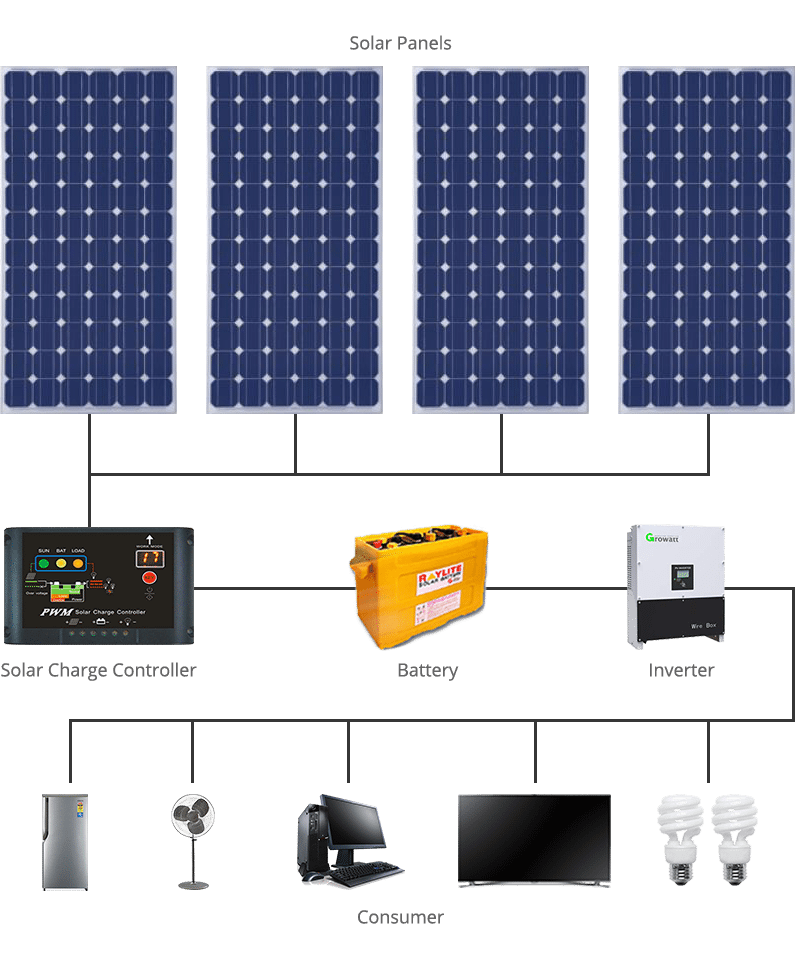
4kW System
Estimated annual electricity bill savings
£600
Suggested for 3 – 4 people
*Saving is an approximation, based on a unit price of 18p/kW (100% Self Consumption), on a 30 degree pitch, south facing roof.*
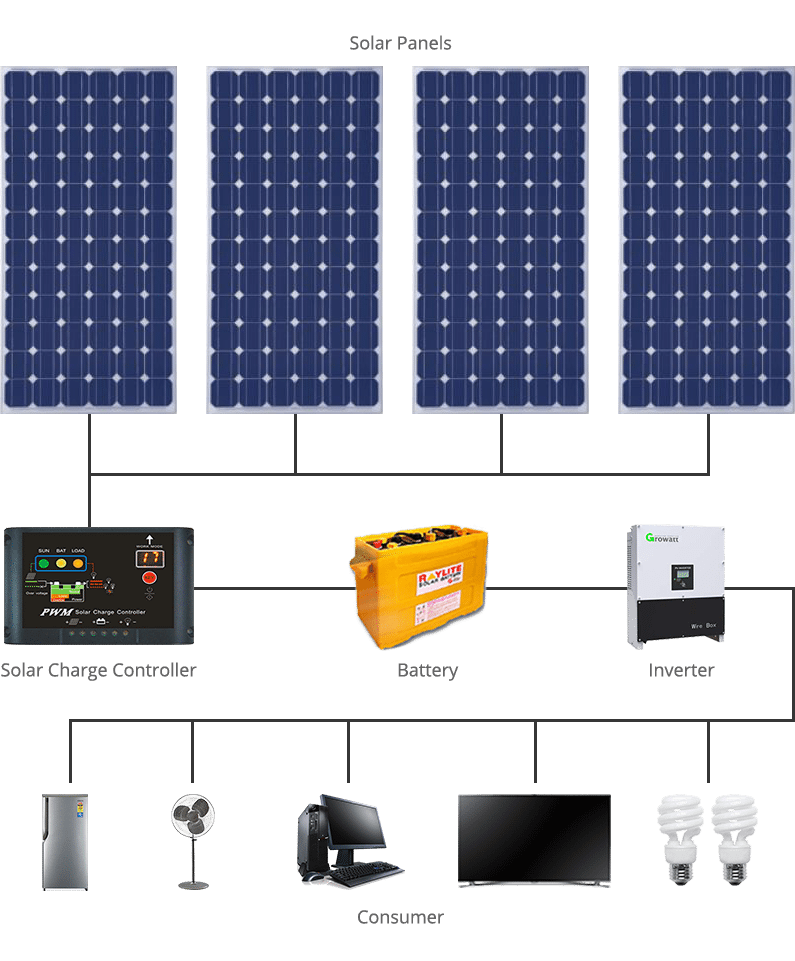
5kW System
Estimated annual electricity bill savings
£750
Suggested for 4 – 5 people
*Saving is an approximation, based on a unit price of 18p/kW (100% Self Consumption), on a 30 degree pitch, south facing roof.*

System Types
The major advantage of a residential solar panel is that it gives you the ability to produce your own power consistently when there is daylight. Solar does not require direct sunlight. The solar power produced during this time is a lot more than the amount of power your home would use in this entire duration.
There are 3 types of solar power systems;
On – Grid Systems
Off – Grid Systems
Hybrid System
On – Grid or Utility Interconnected
This is the most common type and connects the system to the electrical grid and allows the home owners to use both – the grid’s electricity and solar energy. The unique feature of this system is that when the residents do not need power or there is excess of it, the solar panels automatically send the excess electricity produced back to the grid, thereby making it useful somewhere else. On the flip side, in the event that the residential solar panel is unable to produce enough power for the users (due to cloudy and stormy days, night time), the users get their electric supply from the grid.
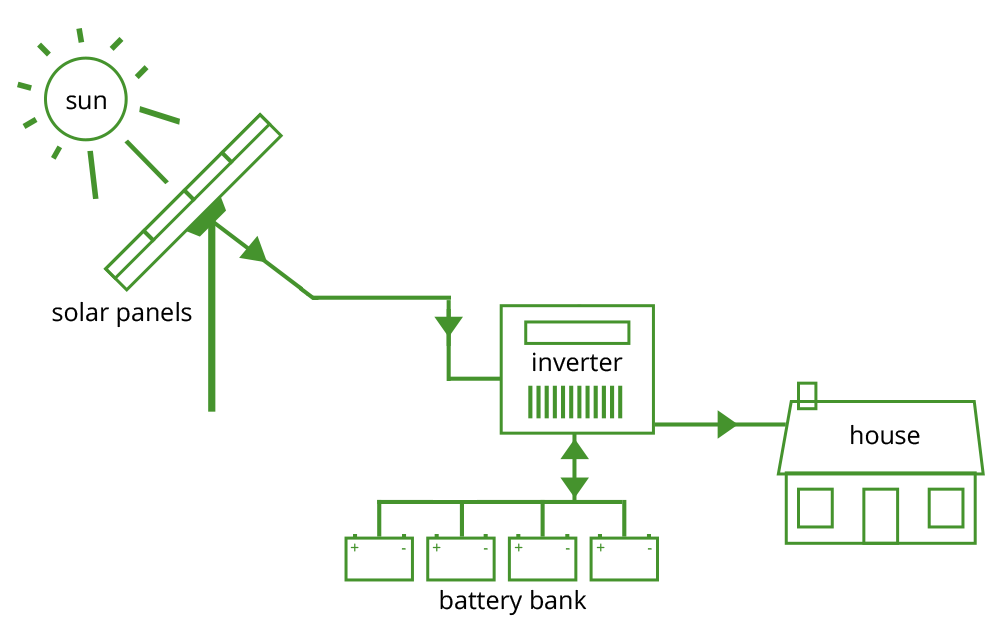
Hybrid System
This system combines the grid connection with the energy storage capacity of your home – i.e. instead of sending the excess power back to the grid (as in On-grid systems), you can store the energy for use during power demand peaks or low production due to less or no sunlight (night time). This residential solar panel system is highly sophisticated and gives its users reliable, cost effective and environmentally friendly solar powered electricity around the clock.
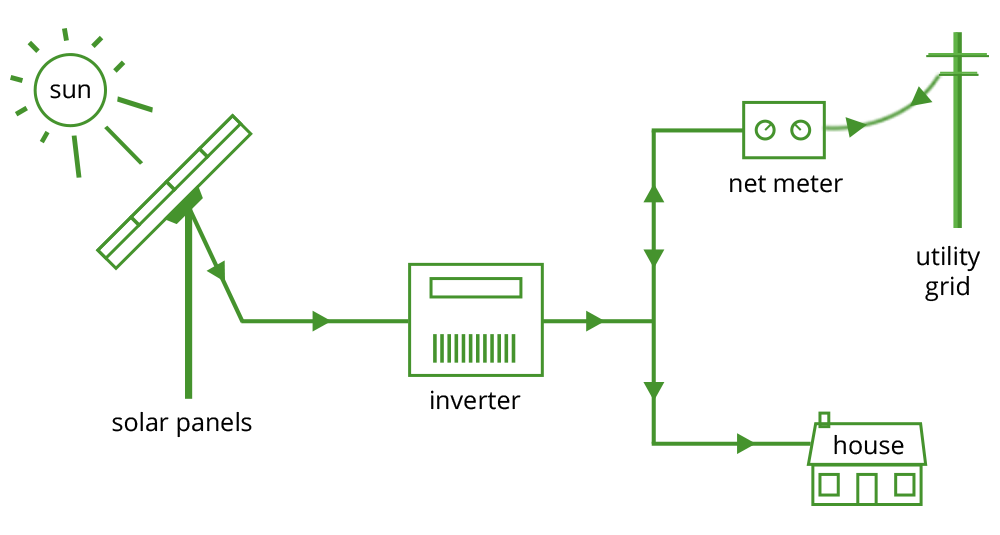
As the name suggests, this power system is not connected in any way to the electricity grid. This system uses batteries instead that help balance out any shortfall and excesses in production and demand.
To ensure that the users do not suffer any inconvenience when the solar panels are unable to produce power and the batteries are discharged, there is an electric generator that can be added, as part of the overall system. This generator would serve as the power source during periods of short or irregular power production and or excessive demand on the power produced.
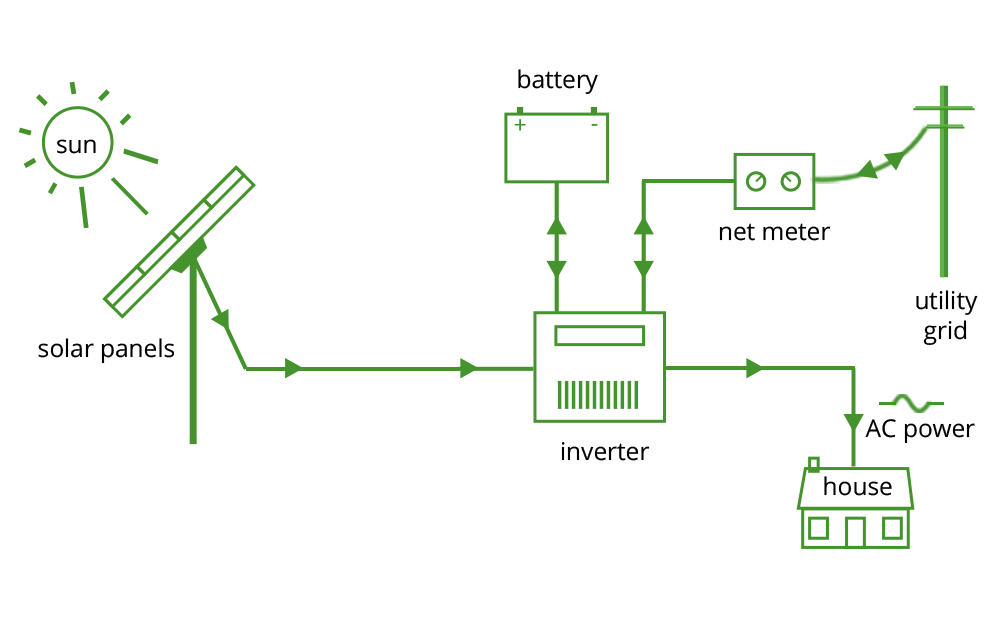
On – Grid System Working Principle
This system works two-ways – the supply of electricity can flow from the grid to which it is connected to the user’s home and from the user’s home to the grid. This feature makes the on-grid solar system affordable and highly useful. The residential solar panels are ‘tied’ to the grid. These panels generate electricity when the sun is shining brightly and this electricity is then ‘sent’ to the electrical distribution panel in the home for use. Any surplus power is then sent back to the grid and this instantly lowers the meter reading of your home. The power charges are only as much as the home uses and in addition, the grid acts as the ‘store’ for the excess power the on-grid solar power system generates.
Off – Grid System Working Principle
The off-grid solar system is not connected to the power grid but instead the energy produced during the day from the sun’s rays, is stored in batteries. This system is efficient for those homes that cannot have access to the electricity produced by the grid and is therefore completely independent of it. The power stored in the batteries is used by homes at night and at other times when the solar panels are unable to generate as much electricity as is required.
This kind of solar system is normally customized to suit the electricity requirements of the home since there is no standard or typical off-grid system. Our experts will ensure that the system will be completely tailored to the specific needs of your home and usage and in addition, our off-grid systems are strong and robust and built to withstand the most inclement weather conditions.
Let us explain how this system works in four easy steps:
Step-1: The power hub is where the solar rays are converted to electricity for use or as stored electricity in the batteries. This hub therefore manages the flow of electricity.
Step-2: The batteries are an essential component of this system as they store any excess electricity that is then used when the solar panels are not generating electricity for any reason
Step-3: You could also opt for the backup generator that will provide the power to recharge the batteries in the event that bad weather or peak demand continues for a while.
Step-4: No changes are required to the present wiring or other appliances in your home as it is possible for this system to combine with the existing system. All your home appliances will operate with the electricity generated.
We at Start Solar provide the best solar power systems that are supported by excellence in customer service and in-depth knowledge of our experts. They will provide the appropriate advice depending on your home electricity needs.
Hybrid Working System
The main difference between the hybrid residential solar system and others is that it has both battery backup and connection to the grid. This system is high on dependability since there is a constant electricity supply to the home. The ability to store the solar electricity in batteries for use at any time, without the need to draw on the electricity generated by the grid greatly reduces electricity costs for the home.
Three easy steps explain how this system works:
Step-1: It works as both the off-grid and on-grid systems – during the day when the sun is shining brightly, the panels convert the rays to electricity and any excess will be stored in the batteries, much like the off-grid systems. However, if even after storing in batteries and using electricity in your home, there is still excess power, the system then sends this excess back to the grid according to the rate of the chosen feed in tariff, similar to the on-grid system.
Step-2: Since the batteries are continually charged during the day, they are able to store enough energy. During times of outages and little or no sunshine, the home can draw its power from these batteries. If however, these adverse situations last for too long, the batteries can be recharged from the grid and your home will only use as much power from the grid as is required to recharge the batteries.
Step-3: Till the batteries are recharged or the grid begins to function as usual, your home will still have an uninterrupted power supply since it will draw power from the grid. This keeps the cost of power down.
Please give us a call on the number provided or fill in the enquiry form and a member of our team will be in touch.
Instagram Feed


